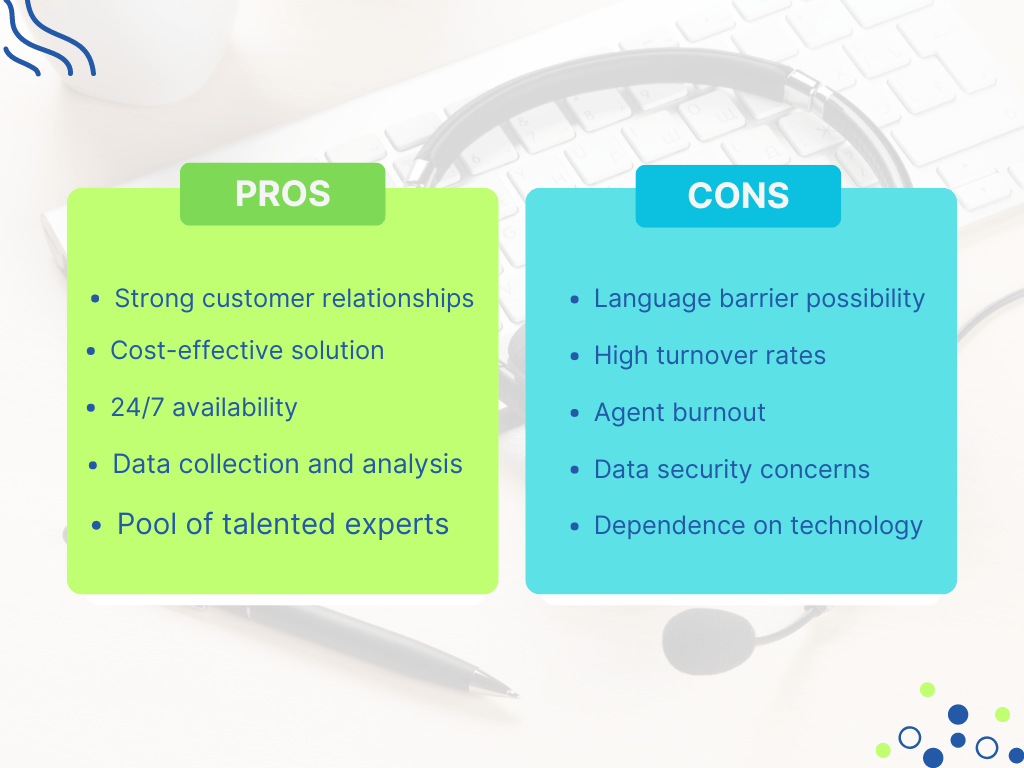
Answering Service Vs Call Center – Which Is Better?
‘Answering Service’ and ‘Call Center’ are two terms that are incorrectly used interchangeably. They are not the same. Despite the identical tall buildings, cubicles, headsets, and buzzing of calls—their functional similarities end at answering inbound calls, taking messages, scheduling appointments, and providing customer support.
Both of them are equally as important to a business, based on its specific needs, as they have their own set of functions and purposes. Some outsourcing companies even offer both services to other businesses. Emenac CCS is one such contact center company. We provide answering services, call center services, and even virtual receptionist service, which you can read more about here.
It is crucial to understand the difference between the two to make the right choice for your business. To fully comprehend the difference between answering service and call center, we have discussed both of them in detail.
What is an answering service?
Answering service is a business that answers calls on behalf of another business, without letting the caller know that the service is outsourced. Their tasks are answering your calls, forwarding them to your designated team member according to the nature of the call, and taking messages (sent to the client via call, text, email, etc.) so they can respond suitably. They also schedule appointments and manage your calendar accordingly. Emergency situations for various industries can also be managed by answering services, if they have adequate training for it.
How does an answering service work?
After your company hires an answering service and delegates a number to it, all your incoming calls are diverted to them. The caller may then be greeted by a pre-recorded automated message or a live agent, depending on the service provider. Answering services are capable of handling high call volumes, with operators trained to simultaneously handle multiple calls. However, service providers focus on just one call at a time.
Automated and live answering services are different types of answering services. Businesses decide differently based on the type of relationship they want to establish with their customers. Live agents can provide a more personalized service than an answering machine, which apparently is a huge deal for customers as 71% consumers expect personalized services form a brand. They can also offer basic information about the business to anyone who needs it.
What is a call center?
Call center clients can tell which statement best describes a call center. Call centers are most suitable for outbound calling; or call centers are the best option for providing customer support to your callers. The answer is both!
A call center is a business that handles both; inbound and outbound calls on behalf of another business. If it only uses VoIP or phone support to communicate with customers, it is termed as a call center. However, if it uses a modern approach and offers technical support to customers via texts, live chat, video calls, or push notifications, it is called a contact center.
Before hiring a call center, it is essential to test whether the team has the right equipment and training to match your business requirements. Their tasks are a bit more extensive than a simple answering service.
Based on the types of calls, call centers can be categorized into a campaign calling center and a B2B call center. A campaign calling center is mostly focused on outbound calls. They make outbound calls for follow-ups, sales marketing, lead creation, survey taking, or appointment reminders. A B2B call center answers inbound calls to assist customers who have questions, need support, or are facing a technical issue. There might be general queries, order placement issues, or complaints that need to be lodged.
What is the difference between an answering service and a call center?
An answering service and a call center both have their own purposes with a very basic difference. An answering service is useful for simple functions such as call answering and taking messages. Whereas, a call center offers technical support and outreach marketing services on top of answering incoming calls, and is useful for achieving much more than just call answering.
A telephone answering service handles all your calls for you. Each caller receives a professional and polite greeting before they are directed to the designated in-office member according to their query or request. Answering service operators are capable of answering FAQs about your business and creating strong relationships with your customers on behalf of your business.
Call centers are responsible for so much more. They answer calls, make calls, take orders and confirm their placement, help with complaints and resolve issues, process payments, and provide information about your company.
Discussed below are the key differences that best explain answering service vs call center.
 Call Volume: Businesses outsource answering services when they need additional help to handle their incoming calls. An answering service can handle a high call volume, whereas a call center can handle even more calls than an answering service.
Call Volume: Businesses outsource answering services when they need additional help to handle their incoming calls. An answering service can handle a high call volume, whereas a call center can handle even more calls than an answering service.- Call Complexity: Call center agents are trained to deal with complex calls and resolve complicated issues before the customer decides to lodge a complaint. Answering services are not equipped to handle difficult situations. They take messages from customers and forward them to your teams instead.
- Call Duration: Answering services have simple conversations with callers that take up to 1-2 minutes at the most. Call centers have longer calls that may last anywhere between 4 and 15 minutes!
- Call Routing: You can rely on call centers to handle your calls all on their own; which can be a good and a bad thing, as it sometimes keeps you out of the loop. Whereas, an answering service only takes messages and routes the call to your team, depending on the nature of the call.
- Types of Calls: Inbound calls are the only type of calls handled by answering services. Call centers answer incoming calls and also make outbound calls for lead generation or marketing, depending on your requirements.
- Scripting: Answering services more or less stick to a standard script as they carry out limited conversation with each caller. Call centers have a customized script for your business and for different situations of different calls.
- General Cost: Answering services are much more budget-friendly and cost-effective on average than call centers. Due to the larger scale of services provided by call centers, they cost more than answering services.
- Automation: Owing to the degree of their customization, call centers are rarely ever automated. Automated or pre-recorded answering services can be found on a lot of platforms.
- Hold Time: Longer calls mean longer hold times for call centers. However, it majorly depends on the volume of calls and the number of agents. Answering services have minimal hold times as their calls are shorter in duration.
- Data Collection: Answering services collect contact information and the message to be forwarded from callers. While call centers collect comprehensive data from each caller; which if not managed properly can become quite a sensitive issue.
So for businesses in need of professional representation, hiring answering services is a better option. While for businesses that need more services than call answering can go for a B2B call center or a campaign calling center. For both choices, it is important to make sure the service provider follows the same compliance policies as you.
Pros and cons of an answering service
An answering service is an indispensable part of any business. However, like every other thing, it comes with its own set of pros and cons. Let’s take a look at both:

Pros:
- 24/7 availability: Answering services enable your business to stay live 24/7. They provide after-hours support to your callers as well, keeping your business accessible even after your work hours are over.
- Improved customer service: You can improve your customer service by outsourcing to an answering service, since it provides professional and reliable support to all your customers.Remaining live 24/7 also helps you build rapport with your customer base.
- Cost-effective solution: If you’re wondering, how much does an answering service cost? You’ll be surprised to know, not much! Since you only have to pay for the service that you use, you can save onboarding and overhead costs.
- More focus on core tasks: By outsourcing call answering, you and your employees save ample time to focus on core tasks without any interruptions, and without any worry of missing important calls or messages.
- Enhanced business image: Answering services ensure that all your calls are answered in a way that aligns with your brand voice. By providing continuous and consistent support to your callers, you can ensure a positive business reputation.
Cons:
- Lack of personalization: Answering services are not always personalized. Impersonal scripts can negatively impact customer relationships. Therefore, it is important for you to personally customize your scripts so that your customers don’t feel alien while contacting you.
- Limited knowledge: Agents might lack expertise in a certain subject area or they may not be as familiar with your business as your in-office employees, which might be evident in their conversation.
- Reliability issues: Outsourcing any service means an increased risk of reliability issues. The service provided by you and other operators can differ, leading to inconsistent customer experiences.
- Compliance risks: There is a high risk of compliance. Some services might not comply with any relevant legal and regulatory policies that you do with. Therefore, it is highly important to make these things clear before hiring a service.
- Integration challenges: There might be some unwanted complications while integrating the answering service with your existing systems and software. Getting the service up to speed with your specific requirements can take time.
Long story short, answering services are important; be it an answering service for appointment scheduling, answering services for small businesses, or an industry-specific answering service. But it is important to carefully consider all points regarding cost, quality, and integration challenges before hiring one for your business. In our biased opinion, you can’t go wrong with Emenac’s answering services!
Pros and cons of a call center
A call center obviously has pros and cons as well. They are listed below for your information, and to help you make a better choice for your business.

Pros:
- Strong customer relationships: Call centers provide exceptional customer service by efficiently handling customer inquiries and complaints. This results in strong relationships with your customers.
- Cost-effective solution: Outsourcing a call center is more cost-effective than hiring an in-office team, buying their equipment, renting out a space, etc. Outsourcing is definitely a better option than managing a team of your own.
- 24/7 availability: Most call centers operate 24/7 and provide uninterrupted services round-the-clock. This improves customer satisfaction and your international outreach as customers from any time zone can contact you when you are live 24/7.
- Data collection and analysis: Call centers utilize advanced software to keep track of customer interactions. This helps you gain valuable insights into customer preferences and ultimately improve your brand.
- Pool of talented resources: By outsourcing call center services, you can access a global pool of talented resources. The scalability that comes with outsourcing also adds to the improvement in your business infrastructure.
Cons:
- Language barrier possibility: There is a high possibility of a language barrier in outsourcing to an off-shore call center. Accents or even poor communication skills can have a bad effect on the service.
- High turnover rates: Due to low satisfaction rates and monotonous nature of call center jobs, they face high turnover rates. This continuous change in employees leads to an adverse effect on the quality of the service.
- Agent burnout: High volume of calls and endless conversations about the same thing over and over again can cause agent burnout. They lose the enthusiasm for customer service and unfortunately it translates into their service.
- Data security concerns: Handling sensitivecustomer data can pose security risks if it is not managed within the provided instructions. This can pose a serious threat to your reputation as customers are very sensitive about data security.
- Dependence on technology: Call centers are heavily dependent ontechnology and their equipment. A single technical issue or system outage can disrupt all their functions and interrupt customer service until the issue is resolved.
To summarize, call centers greatly improve customer support and your business efficiency. But they also require proper management to avoid any potential downsides for both your employees and customers. Emenac CCS is one of the fastest growing call centers in the USA.
Which one should you hire?
When it comes to making the right choice, it isn’t about answering service vs call center, and which service is better—it’s about which service is better for your business?
Deciding between the two depends solely on your business requirements. There are various key factors that need to be considered before you hire an answering service or a call center for your business. We’ve discussed a few of them to help you make an informed decision.
ANSWERING SERVICES
CALL CENTER
| Call Volume | |
| Can handle moderate to low volume of calls.Is used only for incoming calls.Used by small businesses, solopreneurs, or other businesses who only need help with answering calls, taking messages, and scheduling appointments. | Suitable service for high call volume.Is used for both; incoming and outgoing calls.Often used by large enterprises or industries that need dedicated teams to provide personalized customer support, and also perform outbound campaigns. |
| Required Type of Service | |
| Performs basic tasks such as answering calls, taking messages, and answering common inquiries.Generally, focuses on simple tasks and ensures no calls are missed. | Performs a wide array of tasks including customer service, telemarketing, lead generation, etc.Can handle advanced tasks while managing multi-channel communication. |
| Complexity of Interaction | |
| Can handle simple calls by taking customer information and relaying it to your team.Uses standard scripts to address common issues before forwarding the call to your team. | Can handle complex calls that require more information, knowledge, and skills.Leverages trained agents to handle complex issues and provide detailed support to customers who need it. |
| Budget | |
| Different service providers follow different cost structures, but on average, answering services are cheaper than call centers.Pricing is usually based on the number of calls or minutes used. | Cost structures vary from one call center to another, but generally are more expensive than answering services due to extensive infrastructure and services.Pricing is usually based on the number of agents, the complexity of services, and call volume. |
| Personalization of Service | |
| Offers basic services with limited customization.Suitable for businesses needing a direct solution. | Offers more options for customized scripts and personalized services.Suitable for businesses that require tailored interactions to fit their specific needs. |
To conclude, choose an answering service if your business has a low call volume and can easily be managed by an individual, or a small team. Additionally, if you’re in need of a cost-effective solution for simple call answering, message-taking, and appointment scheduling, then answering service is the optimal choice for you.
However, if you require a comprehensive service to manage high call volumes and offer specialized support and personalized customer interactions, you should definitely opt for a call center service.
For the best service for your business, contact Emenac CCS today and watch how your calls are dealt efficiently and professionally!
Leave A Reply
Your email address will not be published. Required fields are marked *



